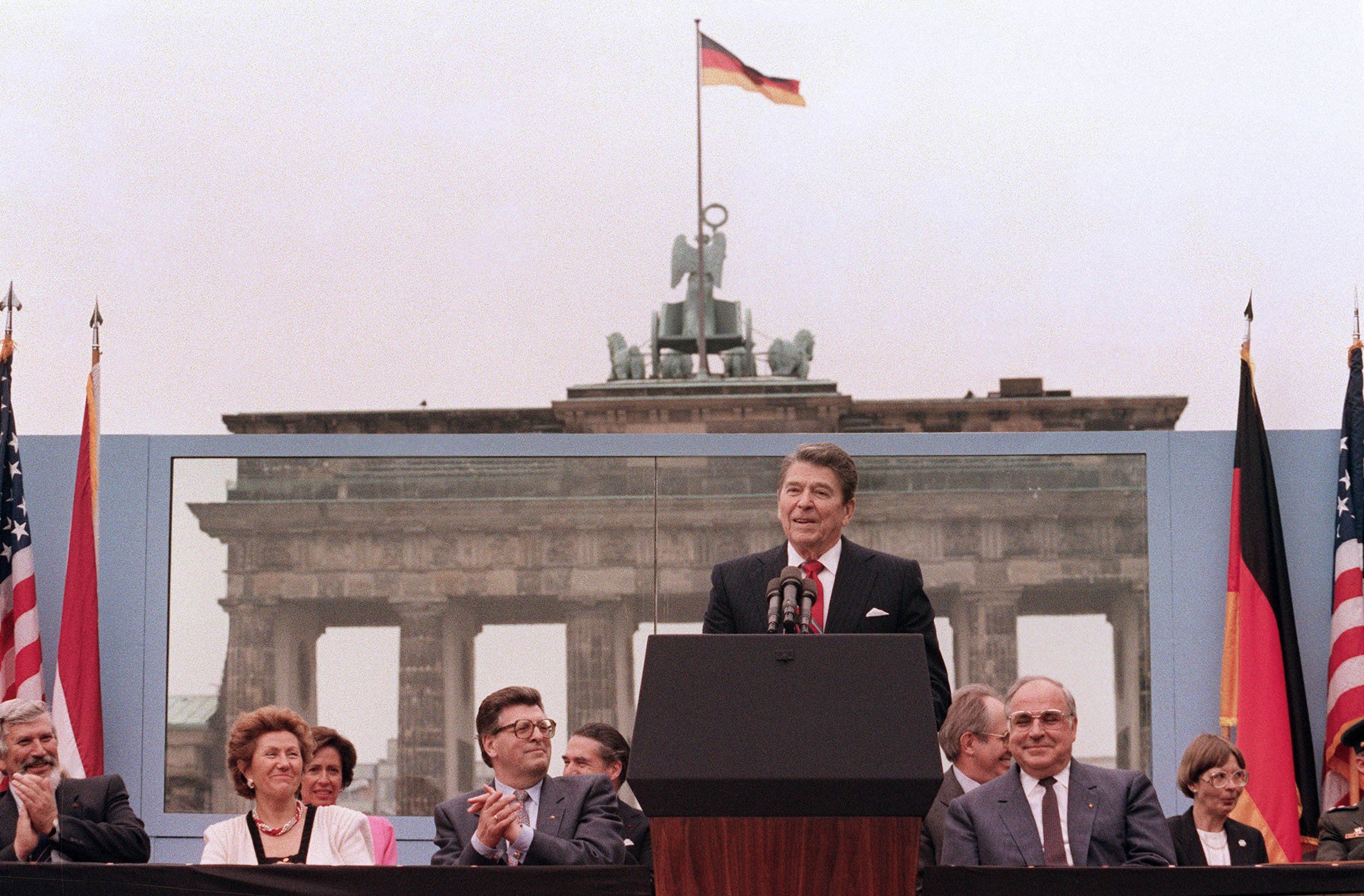
On this day in 1987, Ronald Reagan gave his Soviet counterpart some pretty direct advice. Standing in front of the Brandenburg Gate, his back protected by bulletproof glass, he issued these famous commands: "Mr. Gorbachev, open this gate. Mr. Gorbachev, tear down this wall." And, some 29 months later, in what is perhaps the most literal representation of the Cold War's end, the wall that had once separated East Berlin and West Berlin did indeed come down.
You might think that such a famous presidential speech would have made it onto the cover of Newsweek, but not all important events are recognized as such right away. In fact, the cover of the June 22, 1987 issue featured Robert De Niro dressed up as Al Capone, part of a feature on the film The Untouchables, which came out that year.
The now-famous quotation about bringing down the wall were reported in the middle of the second paragraph of a story about a G7 summit that Reagan had just attended in Venice. (Was the article's headline, "Waiting for Gorbachev," a reference to the play Waiting for Godot?) Reagan is depicted in this story as a rather weak character. He's a "lame duck" and "beleaguered"; the Iran-Contra affair is "still closing in on him." Not only that, at the end of the Venice summit, it seems that he fell asleep—"his head kept drooping." The article argues that a third summit with Gorbachev, and scoring an agreement on a specific kind of nuclear-weapons reduction, would be "the best, and perhaps last, hope for reinvigorating his presidency."
Oh yeah, and he also gave "a rousing speech in West Berlin."
It may have been rousing, but the speech was also met with doubt by those who didn't think the wall was going to come down anytime soon. "We were all a little more skeptical than American politicians—the significance and the chances of tearing down the wall, there we were skeptical," the mayor of West Berlin at the time of the speech recalled in 2007.
There was also concern in 1987 that telling Gorbachev to take the wall down might be "perceived as provocative," George Shultz, the secretary of state from 1982 to 1989, told Time in 2007. "At the time some people argued, why stick your finger in [Gorbachev's] nose?" In fact, the Gipper almost didn't include the now-famous words. Both the State Department and the National Security Council thought it wouldn't be wise to include them, and it was only on the trip to the wall that Reagan said he actually would, as Time points out. The fact that the wall eventually came down validated Reagan's decision.
Words that at one time were controversial are now a famous sound bite, and have even been remixed to the tune of "Like A G6." (The vocals and video in the original are a little better, I think.)
In 2008, while he was running for president, Barack Obama also gave a speech in Berlin, and this time over 100,000 people were there, a lot more than the 20,000 who gathered to hear Reagan in 1987. Writing for Newsweek, Louisa Thomas put Obama's speech on a continuum with John F. Kennedy (who gave his famous Ich bin ein Berliner speech in that city in 1963) and Reagan. Reagan, Thomas writes, "understood stagecraft, and the fall of the wall two and a half years later made his words prescient. That is the stage that Reagan sought—history, not necessarily the next day's paper." (Or the next week's Newsweek.)
Obama, she says, had the same idea in mind: "He came to convince a larger, global audience that he is, in fact, a transformative figure—Reaganesque, as it were."
Uncommon Knowledge
Newsweek is committed to challenging conventional wisdom and finding connections in the search for common ground.
Newsweek is committed to challenging conventional wisdom and finding connections in the search for common ground.
About the writer
Rob Verger is liaison to Newsweek’s foreign editions and also reports, writes, and edits. In addition to Newsweek and its ... Read more
To read how Newsweek uses AI as a newsroom tool, Click here.





